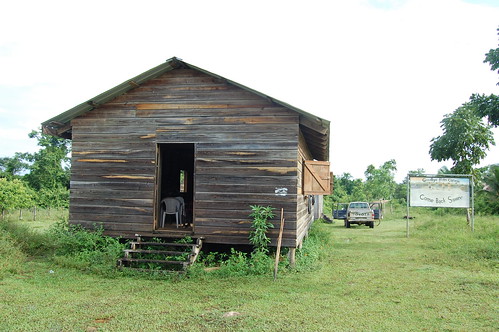From inside the small, one room wooden building in Conejo, I can hear the usual drone of jungle insects and birds as the sun begins its downward descent. While outside the day is winding down, inside is a completely different story. SATIIM has called a meeting with Conejo, a Maya community facing exploitation by an oil company, U.S. Capital Energy, despite winning a historic land rights case five years ago.
Back in February two SATIIM park rangers veered from their usual patrol route and discovered that USCE had illegally started clearing a seismic line 3 miles long and up to 8 feet wide through Conejo land in the Sarstoon Temash National Park. In response, Conejo community members successfully petitioned the government to halt USCE’s actions since USCE had not received free, prior, and informed consent from the community. As a result, USCE has been forced to stop all operations in the Toledo District.
Fast forward five months, and SATIIM is in Conejo to complete a damage assessment to determine what was cut down when the seismic line was cleared and its financial value. What I thought would be a relatively tame meeting where SATIIM and the private consultant, Paul Walker, were going to discuss the purpose of the visit and ask for community input, has turned explosive.
Normally, I think, when people oppose oil drilling, it is primarily for environmental reasons. This meeting however, reminded me of the very real social impact of oil drilling. I’m not talking about the creation (or not) of jobs, the impact that sudden modernization can have on a community, or the effect that the unfulfilled promises of oil exploration can have on a community. Let’s shelf all that for now and consider the fact that Conejo, a town of 190 people, a town that has proudly stood before the government to assert its right to its ancestral land, is now a community divided. Divided by an oil company. That, to me, is worse than the environmental damage.
As Paul Walker began to discuss what the purpose of his visit was, and what we hoped to accomplish in the next few days, you could feel the tension in the room. When he finished his explanation, he asked if there were questions. And were there ever. Well, not questions, but well-deserved opinions. A very vocal contingent was fuming that SATIIM and the majority of Conejo had stepped in to halt the illegal oil exploration. This action had cost the community 23 jobs. Did SATIIM want Conejo to remain underdeveloped? How was it fair that in Conejo they should be left without electricity and forced to bathe in rivers filled with animal manure, while around them development was occurring?
Another contingent was upset that those providing unconditional support for the oil company could be so shortsighted. It’s not that those that had halted the oil exploration are opposed to it, it’s that they want it done legally. As the meeting continued to go in roundabout circles, Paul, the consultant, tried to emphasize the importance of a united front, of Conejo coming together to develop a plan for dealing with USCE. If Conejo is going to allow drilling by USCE in traditional lands (as it seems inclined to do), Paul and the village elders were highlighting that they must look beyond the promise of jobs. Yes, the oil company can give you a job, but if they can get away with paying you $4 an hour and not give you anything for your land, they will do it. What the village leaders and elders were saying was that any dealings with the oil company needed to be legal, and needed to provide more benefits for the community than jobs. The leaders were saying that they needed social, community development, financial payment for the use of their communal lands, and environmental commitment from the company. Without these guarantees and agreements, the village leaders fear they will only experience the negative externalities of oil drilling, and none of the benefits.
This conversation continued for three hours, with community members storming in and out, emotional monologues, and no resolution. This is an incredibly important time for Conejo, a time that will determine the future of grandchildren and great grandchildren of the community. In order for Conejo to most successfully develop, consensus needs to be established, and that consensus seems quite a ways off. No doubt this will rattle idyllic thoughts of a simple, calm, communal life of indigenous communities. But this is real, and it is happening now.
Posted By Laura Burns
Posted Jul 23rd, 2012


